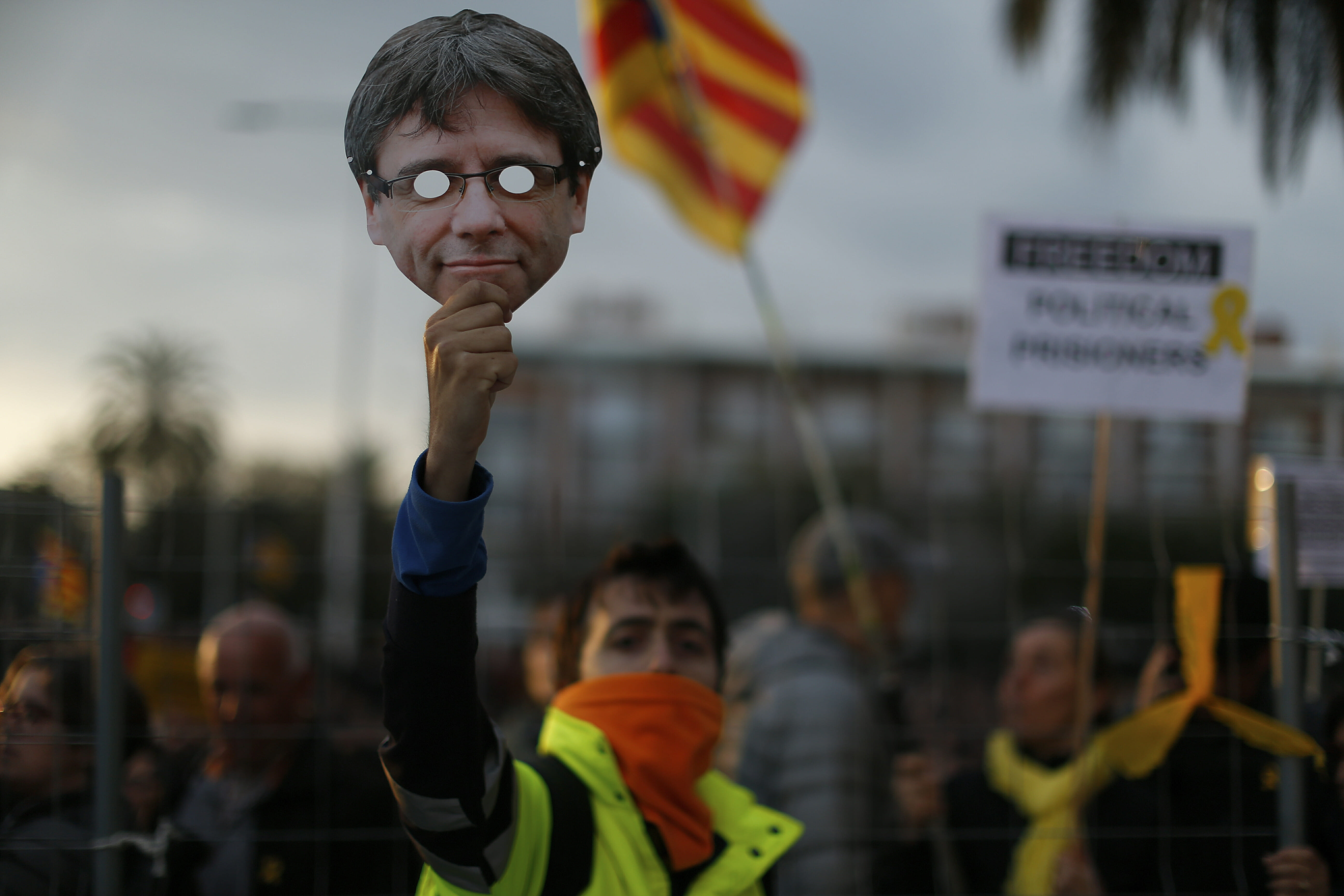Catalonia’s Ex-Leader Freed on Bail
Spain is seeking Carles Puigdemont's extradition from Germany on charges of rebellion and misuse of public funds over his role in the Spanish region’s independence referendum, held in October. A demonstrator holds up a Carles Puigdemont mask during a protest over the detention of the deposed leader. (Manu Fernandez / AP)
A demonstrator holds up a Carles Puigdemont mask during a protest over the detention of the deposed leader. (Manu Fernandez / AP)
UPDATE: The Associated Press reported Friday that former Catalan leader Carles Puigdemont walked out of a German prison after posting 75,000 euros ($92,000) bail, demanding that Spanish authorities release fellow Catalan separatists and open a dialogue on his region’s future.
The state court in Schleswig said Thursday that the charge of rebellion Puigdemont faces wouldn’t warrant extradition because the equivalent German law presumes the use or threat of force sufficient to bend the will of authorities. Puigdemont can still be extradited on the less serious charge of misuse of funds.
Carles Puigdemont, the former leader of Spain’s Catalonia region, has sent a message from prison to his supporters in Spain, saying they must continue to defend their rights. His March 25 arrest in Germany led thousands to take to the streets of Barcelona and other cities and towns in northeastern Spain. More than 50 protesters and police officers were injured, and four people were arrested.
Puigdemont faces extradition from Germany over his role in Catalonia’s independence referendum, held in October.
His audio message, made public this week, was recorded by Diether Dehm, a member of the German parliament from the leftist Die Linke party. Exactly when the recording was made was unclear. It was the first time Puigdemont had spoken publicly since he was detained.
The BBC reports Puigdemont as saying, in part:
As a message I would like to say that we have to go on, we have to go on the way we are, defending our rights, rights that are recognized by the UN as we have a total right to decide our future.
We cannot let down our guard before a state that is becoming more and more authoritarian and that is curtailing our rights. Let’s go on doing things the way we do them, which is non-violent and civilised as we have shown the world in the past years. That is how Catalans do things.
The Oct. 1 referendum calling for Catalonia’s independence passed with 90 percent of voters favoring the measure. Approximately 43 percent of eligible voters cast ballots, but many boycotted the referendum as a protest against it. Tensions in Spain soared in the wake of police violence against demonstrators. More than 900 people were injured when police fired rubber bullets, used clubs and tear gas and dragged some protesters by their hair. In addition, roughly 770,000 votes were reported to have been seized or destroyed by the Spanish police.
On Oct. 27, the Spanish government imposed direct rule on the region, dissolving its Parliament. The same day, Catalonia’s Parliament unilaterally declared independence, and Puigdemont went into self-imposed exile in Belgium.
Spain issued an arrest warrant for Puigdemont and other Catalan separatists on charges of sedition, rebellion and misusing public funds—charges that could put the accused in prison for up to 30 years.
On Nov. 5, Puigdemont and four associates turned themselves in to the Belgian police. Spain then requested his extradition.
On Dec. 5, Spain’s supreme court withdrew Puigdemont’s arrest warrant.
According to the website Fair Trials International:
The EAW [European arrest warrant] involves a judicial procedure in which governments, in principle, do not have a role to play.
When the EAW was first examined by the Belgian court overseeing the request from Spain, it was reported that Mr Puigdemont’s legal counsel argued that his client’s fundamental rights, including his right to a fair trial, would not be guaranteed in Spain.
Further, it was expected that the Belgian court would seek clarification from its Spanish counterpart regarding the offences on which the EAW was based (misuse of public funds, sedition and rebellion). The Belgian court may have sought to confirm that the Spanish law offences of “sedition” and “rebellion” were also foreseen in Belgian law. In this respect, the EAW allows the executing State (the country that is being requested to surrender the individual) to refuse to execute an EAW in certain limited circumstances, including, in respect of certain offences, where the EAW is based on an act which does not constitute an offence under the law of the executing Member State.
The Belgian court could, therefore, have refused to execute the EAW or accepted to send Mr Puigdemont back to Spain subject to a guarantee by Spain that Mr Puigdemont would not be tried in respect of any offence not recognised under Belgian law, including rebellion and sedition. This would have had a significant impact on the Spanish prosecution, as rebellion was the main offence carrying a prison sentence of up to 30 years.
In December, Spain’s prime minister, Mariano Rajoy, called for snap elections to “restore democracy” in the region. In the vote, separatists held their lead in the Catalan Parliament and Puigdemont was re-elected. Puigdemont relinquished his seat March 1 and backed detained activist Jordi Sanchez to run for the Catalan presidency.
On March 22, Puigdemont traveled to Finland. The next day, Spain’s supreme court reactivated the extradition request and formally charged Puigdemont with rebellion and misuse of public funds.
As he was traveling back from Finland to Belgium by car, Puigdemont was arrested by German police—aided by Spanish intelligence—after he crossed Germany’s border with Denmark.
German prosecutors said Tuesday that Spain’s request to extradite the former Catalan president was valid and requested that the court send Puigdemont to face charges of rebellion in Madrid. German judges have 60 days to consider the request to hand him over.
Your support is crucial...As we navigate an uncertain 2025, with a new administration questioning press freedoms, the risks are clear: our ability to report freely is under threat.
Your tax-deductible donation enables us to dig deeper, delivering fearless investigative reporting and analysis that exposes the reality beneath the headlines — without compromise.
Now is the time to take action. Stand with our courageous journalists. Donate today to protect a free press, uphold democracy and uncover the stories that need to be told.


You need to be a supporter to comment.
There are currently no responses to this article.
Be the first to respond.